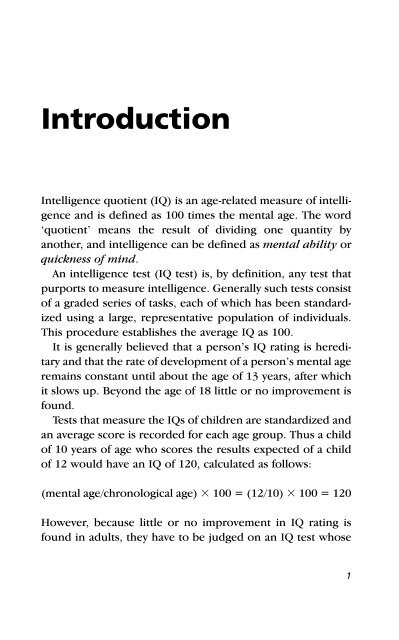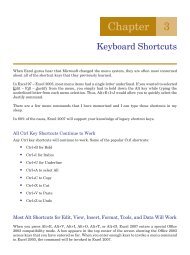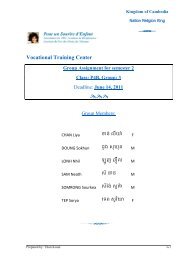- Page 1 and 2: IQ400Succeed atTestsImprove your Nu
- Page 3 and 4: iiThis page is left intentionally b
- Page 5 and 6: First published in Great Britain an
- Page 7: viThis page is left intentionally b
- Page 11 and 12: Succeed at IQ Testscommonplace IQ t
- Page 13 and 14: Succeed at IQ Tests3. Which word in
- Page 15 and 16: Succeed at IQ Tests9.is to:as:is to
- Page 17 and 18: Succeed at IQ Tests14.What comes ne
- Page 19 and 20: Succeed at IQ Tests21. Make a six-l
- Page 21 and 22: Succeed at IQ Tests29. Which pentag
- Page 23 and 24: Succeed at IQ Tests31. Change MILK
- Page 25 and 26: Succeed at IQ Tests39. Trace the le
- Page 27 and 28: Test One: Answers1. C; so that one
- Page 29 and 30: Succeed at IQ Tests22. calibrate23.
- Page 31 and 32: Test Two: Questions1. Which is the
- Page 33 and 34: Succeed at IQ Tests7. What number i
- Page 35 and 36: Succeed at IQ Tests12. Sally had a
- Page 37 and 38: Succeed at IQ Tests20. How many min
- Page 39 and 40: Succeed at IQ Tests29. Find the hig
- Page 41 and 42: Succeed at IQ Tests36. Fill in the
- Page 43 and 44: Succeed at IQ Tests40. Trace the ch
- Page 45 and 46: Succeed at IQ Tests11. C; in all th
- Page 47 and 48: Succeed at IQ Tests37. c. doylt38.
- Page 49 and 50: Succeed at IQ Tests2. Find two word
- Page 51 and 52: Succeed at IQ Tests7. What number s
- Page 53 and 54: Succeed at IQ Tests11. Which two nu
- Page 55 and 56: Succeed at IQ Tests14.What comes ne
- Page 57 and 58: Succeed at IQ Tests21. Place two th
- Page 59 and 60:
Succeed at IQ Tests29. Trace the ch
- Page 61 and 62:
Succeed at IQ Tests32. What is a sy
- Page 63 and 64:
Succeed at IQ TestsA, B, C or D?45
- Page 65 and 66:
Succeed at IQ Tests9. donkey10. A;
- Page 67 and 68:
Succeed at IQ Tests36. D; A - VESSE
- Page 69 and 70:
Succeed at IQ Tests4. What number s
- Page 71 and 72:
Succeed at IQ Tests11. Change just
- Page 73 and 74:
Succeed at IQ Tests15. Find two wor
- Page 75 and 76:
Succeed at IQ Tests20.To which squa
- Page 77 and 78:
Succeed at IQ Tests29.?Each line an
- Page 79 and 80:
Succeed at IQ Tests36. What is the
- Page 81 and 82:
Succeed at IQ Tests40. Each of the
- Page 83 and 84:
Succeed at IQ Tests9. 172; so that
- Page 85 and 86:
Succeed at IQ Tests34. 2 + 7 16 -
- Page 87 and 88:
Succeed at IQ Tests3.?Which circle
- Page 89 and 90:
Succeed at IQ Tests7. 4863 - 243681
- Page 91 and 92:
Succeed at IQ Tests13. Which four o
- Page 93 and 94:
Succeed at IQ Tests18. Find two wor
- Page 95 and 96:
Succeed at IQ Tests22. Replace the
- Page 97 and 98:
Succeed at IQ Tests29. Which hexago
- Page 99 and 100:
Succeed at IQ Tests33. What have th
- Page 101 and 102:
Succeed at IQ Tests39. Find two wor
- Page 103 and 104:
Test Five: Answers1. tiny, colossal
- Page 105 and 106:
Succeed at IQ Tests18. resolute, do
- Page 107 and 108:
Test Six: Questions1. SundayMondayT
- Page 109 and 110:
Succeed at IQ Tests4. 4 5 6 3 3 67
- Page 111 and 112:
Succeed at IQ Tests10. Which four o
- Page 113 and 114:
Succeed at IQ Tests16. What numbers
- Page 115 and 116:
Succeed at IQ Tests20.What comes ne
- Page 117 and 118:
Succeed at IQ Tests27. Place the ni
- Page 119 and 120:
Succeed at IQ Tests35. Which seven-
- Page 121 and 122:
Succeed at IQ Tests40. Which oval s
- Page 123 and 124:
Succeed at IQ Tests10.DBEC11. £48:
- Page 125 and 126:
Succeed at IQ Tests31. Orders must
- Page 127 and 128:
Succeed at IQ Tests4. Complete the
- Page 129 and 130:
Succeed at IQ Tests9. Which is the
- Page 131 and 132:
Succeed at IQ Tests14.O AN RR THSP
- Page 133 and 134:
Succeed at IQ Tests19.45 16 91115 3
- Page 135 and 136:
Succeed at IQ Tests27. Find a nine-
- Page 137 and 138:
Succeed at IQ Tests31. What is the
- Page 139 and 140:
Succeed at IQ Tests39. Find a word
- Page 141 and 142:
Test Seven: Answers1. E; it is the
- Page 143 and 144:
Succeed at IQ Tests21. homily, addr
- Page 145 and 146:
Test Eight: Questions1. Which is th
- Page 147 and 148:
Succeed at IQ Tests6. Which number
- Page 149 and 150:
Succeed at IQ Tests9. What number s
- Page 151 and 152:
Succeed at IQ Tests13.is to:as:is t
- Page 153 and 154:
Succeed at IQ Tests19. Which word i
- Page 155 and 156:
Succeed at IQ Tests28. Solve the RE
- Page 157 and 158:
Succeed at IQ Tests33. Find a six-l
- Page 159 and 160:
Succeed at IQ Tests40. Find a word
- Page 161 and 162:
Succeed at IQ Tests10. A; the black
- Page 163 and 164:
Succeed at IQ Tests29. 3A30. D; 1 i
- Page 165 and 166:
Succeed at IQ Tests3. What number s
- Page 167 and 168:
Succeed at IQ Tests8. 7, 4, 11, 2,
- Page 169 and 170:
Succeed at IQ Tests13.When the abov
- Page 171 and 172:
Succeed at IQ Tests17. Seven synony
- Page 173 and 174:
Succeed at IQ Tests27. Find a nine-
- Page 175 and 176:
Succeed at IQ Tests34. Find the wor
- Page 177 and 178:
Succeed at IQ TestsWhich of the cir
- Page 179 and 180:
Succeed at IQ Tests9. D; the rectan
- Page 181 and 182:
Succeed at IQ Tests30. C6 + 4 = 106
- Page 183 and 184:
Test Ten: Questions1.is to:as:is to
- Page 185 and 186:
Succeed at IQ Tests5. Find the star
- Page 187 and 188:
Succeed at IQ Tests10. Which is the
- Page 189 and 190:
Succeed at IQ Tests14.Which is the
- Page 191 and 192:
Succeed at IQ Tests17.What comes ne
- Page 193 and 194:
Succeed at IQ Tests23. Simplify 1
- Page 195 and 196:
Succeed at IQ Tests32. What is the
- Page 197 and 198:
Succeed at IQ Tests38. Fill in the
- Page 199 and 200:
Test Ten: Answers1. C; the triangle
- Page 201 and 202:
Succeed at IQ Tests21. bordello22.
- Page 203 and 204:
196This page is left intentionally
- Page 205 and 206:
How to Pass Advanced Verbal Reasoni
- Page 207 and 208:
ALSO AVAILABLE FROM KOGAN PAGEISBN:
- Page 209:
ALSO AVAILABLE FROM KOGAN PAGEISBN:









